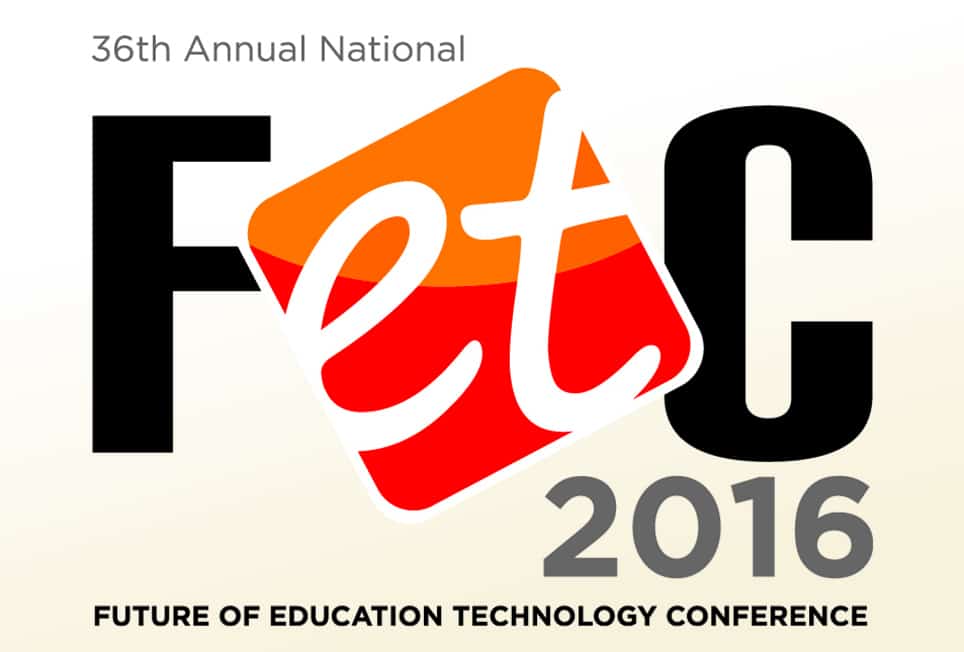#FETC | Moving Student Consumers to Creators of Digital Games

Cori Coburn
Over thirty years ago I was a child peering up to a new video game console, in awe of a new hero. Dirk the Daring was not the pixelated sprites of other mainstream video game favorites like Pac-man, Frogger and Tetris. He was the animated human hero of Dragon’s Lair, his smooth animations were the product of Don Bluth, a then-Disney animator.
The original Disney headquarters of Orlando, Florida is the host of the 36th annual Future of Educational Technology Conference. FETC is one of the premier conferences on employing innovation & technology in the classroom. Over 8,500 kindergarten through college education leaders and technology experts gather to share solutions, discover new trends, network and engage in hands-on learning workshops. Of the nine conference focus areas, one of the most popular is ”Digital Teaching Tools and Game Based Learning” which has nearly 200 learning sessions and workshops. A variety of featured sessions speak to some traditional and nontraditional trains of thought. I spoke to some participants who have made a point to visit these sessions. They cite a shared interest in finding tools that enable educators to customize learning materials and introduce engaging content to students.
While there are excellent technology tools available to help educators create engaging content, I would like to invite a change of perspective:
Seek the tools and opportunities that allow students to become the creators of these game based tools.
A lot has changed since I spied Dragon’s Lair those decades ago. Back then, I was excited when I saw a new character in a game that remotely resembled actual people. Today’s students have the ability to design avatars of themselves that are the heros of the games they create and share with the world.
Students have an extraordinary opportunity to own their learning in the creation of digital games and coding new programs. The push for the inclusion of females and various ethnicities in the characters and positive presence in the story lines is a hot topic of conversation at various conferences and professional events. FETC keynote speaker Reshma Saujani (Girls Who Code Founder) spoke to the need to encouraging and providing opportunities for gender diversity in computer science, “Seventy four percent of girls that graduate high school say they want to do something that helps change the world…Technology can help them do something they are passionate about.”
Shared by @Reshmasaujani of #girlswhocode (voice-over at the end)”Inspire Her Mind” Verizon Commercial #edtech #FETC https://t.co/AhlkmxqCO1
— Cori Coburn-Shiflett (@CoburnCori) January 13, 2016
The evolution of digital games’ place in education should be shifting from students as consumers to students as creators. According to research conducted by the Joan Ganz Cooney Center, the current trend of digital games in school shows that the majority of teachers surveyed still prefer to use games as a student reward or for motivation.
Among seasoned educational technologists, you might hear a version of the phrase that “It’s not the tool, it is the content.” Today’s educators are in a wonderful position to hand students the power of both tools and content through digital games.
If our purpose at FETC is to promote the best technological integration practices in educational institutions, we must consider digital games as a pathway to powerful student learning. From idea to execution, students work through failures so they can share their ideas, inspire each other, and see themselves as their own heroes.
For more check out:
Cori Coburn is a Digital Learning Coach at Georgetown Independent School District near Austin, TX. Follow Cori on Twitter, @CoburnCori.
Stay in-the-know with all things EdTech and innovations in learning by signing up to receive the weekly Smart Update. This post includes mentions of a Getting Smart partner. For a full list of partners, affiliate organizations and all other disclosures please see our Partner page.







0 Comments
Leave a Comment
Your email address will not be published. All fields are required.